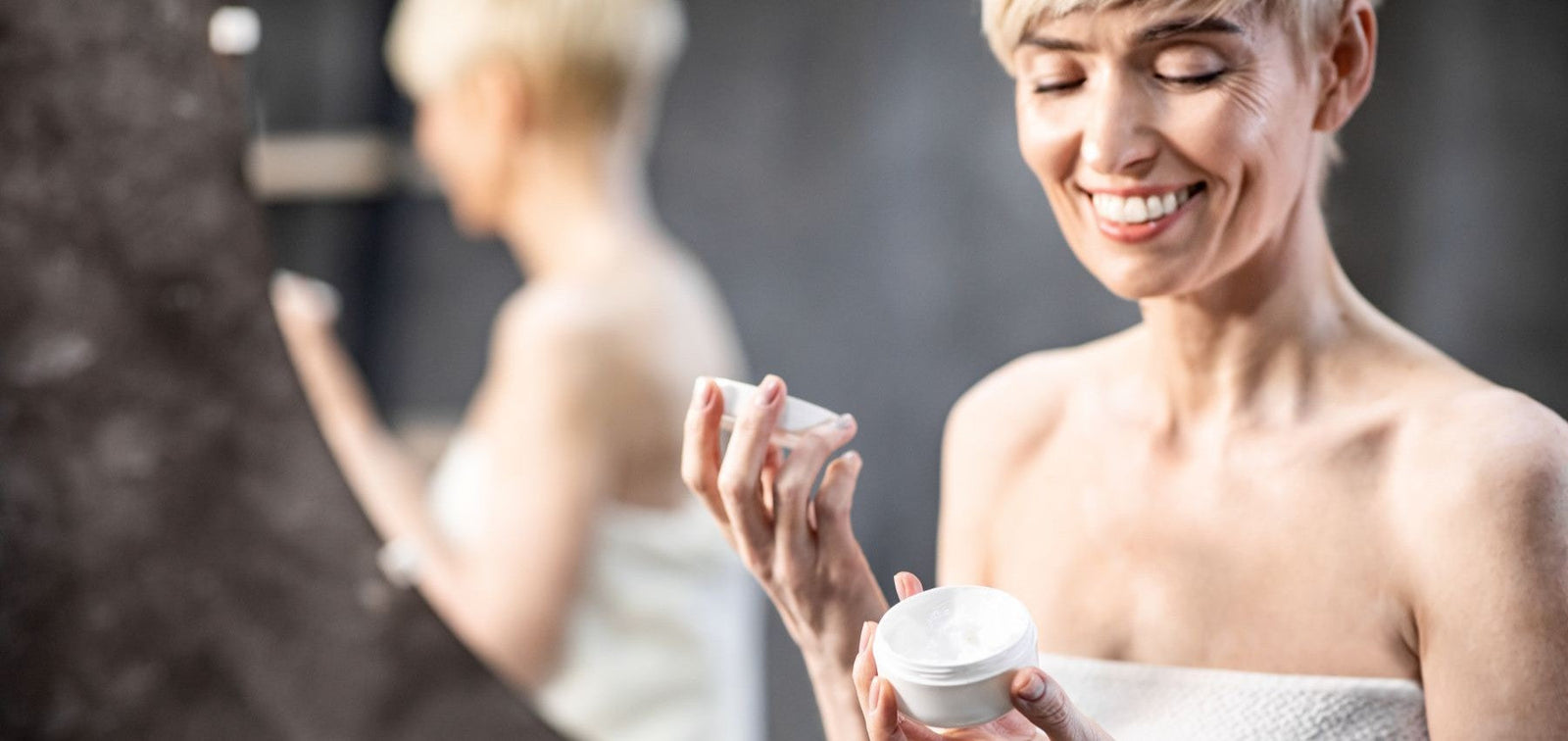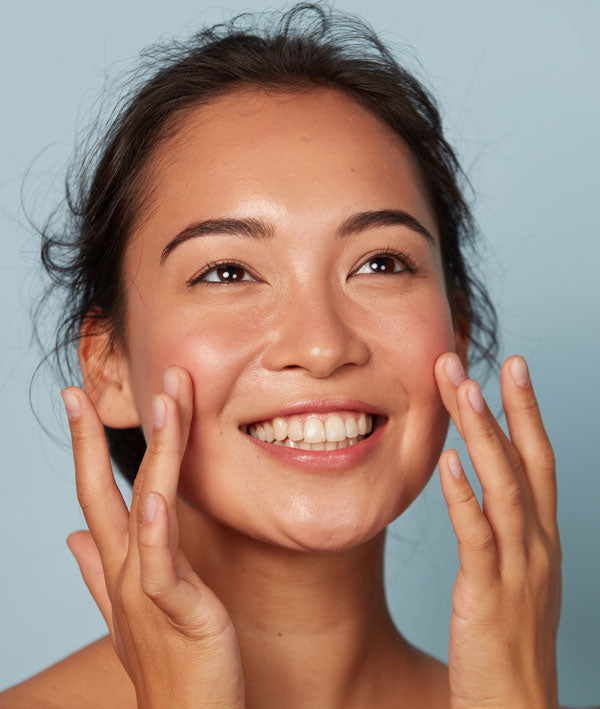If you want to make the most out of your skincare products (and get the best possible results), it’s important to make sure you’re applying everything in the correct order. We’ll answer the question, "Should I apply serum before moisturizer?"and detail how using them in the correct order benefits your complexion.
Serum vs. Moisturizer: What's the Difference?
Moisturizers are responsible for ensuring your skin stays hydrated and healthy. They’ll typically contain a combination of emollients, humectants, and occlusives that work together to soften and support barrier health while attracting moisture to the skin and sealing it in.
Serums, on the other hand, are lighter formulas that absorb quickly into the skin. They have high concentrations of active ingredients that help treat certain issues, such as dullness, blemishes, dark spots, or signs of aging.
There are plenty of different active ingredients that can be used in serums. Some common options include vitamin C, retinol, chemical exfoliants (alpha hydroxy acids and beta hydroxy acids), niacinamide, hyaluronic acid, coenzyme Q10, and peptides.
It should be noted that a moisturizer can contain active ingredients that target specific issues. However, they typically will have lower concentrations of these ingredients than serums. When adding a serum to your routine, you should always check to make sure the formula doesn’t contain any ingredients that don’t play well with the ingredients in your moisturizer.
Do Serums Go First?
So. do you use moisturizer or serum first? As a general rule of thumb, you should apply your products in order from thinnest to thickest. In most cases, serums have thinner solutions than moisturizers, which means serums should be applied first. By applying a serum directly to clean skin, you’re giving all of those potent active ingredients the best chance to deeply penetrate the skin and work as effectively as possible.
While applying a serum after a moisturizer may not be harmful, it’s not the most effective order of operations. Moisturizers are thicker, and often contain occlusive ingredients that can prevent ingredients from fully absorbing into the skin. For example, this means that if you apply a moisturizer andthen a vitamin C serum, that powerful antioxidant isn’t going to be able to penetrate the skin and do what it’s supposed to do.
There is a caveat to this rule. Some people choose to decrease the effects of serums that may aggravate the skin by applying a moisturizer and then the serum. This is a common practice with retinoids, which are known to cause irritation and dryness. People with sensitive skin – or people new to using this ingredient – sometimes do what is called the “retinol sandwich” technique, where you apply a moisturizer before the retinol serum to counteract the negative effects.
Skincare Application Order
Regardless of your skin type, there is a basic order that you can follow for applying skincare products. After cleansing in the morning, you can apply a serum (or multiple serums, in order from thinnest to thickest), a moisturizer, and then sunscreen. In the evening, you’ll cleanse your skin and then follow the same order (but of course, omit the sunscreen).
Serums to Use in the Morning vs. Evening
There are some serum ingredients that work best when used at certain times. In the case of products containing retinoids or chemical exfoliants (like salicylic acid and glycolic acid), it is safest to use them in the evening. These ingredients increase the skin’s sensitivity to the sun, which means you should apply them at night.
While there’s certainly no harm in using an antioxidant-powered serum (such as avitamin C serum or aCoQ10 serum) in the evening, they’re particularly great to use during the day. This is because the antioxidants can work to defend your complexion against damage from environmental aggressors you encounter during the day, such as air pollution and UV rays. These types of serums can often be used both in the morning and at night.
How Long Should You Wait To Put Your Moisturizer On After Your Serum?
You don’t need to wait forever between steps, but giving your serum a little time to absorb is smart. Once you’ve applied your serum, let it sit for about 30 to 60 seconds. You want it to sink into your skin and start doing its job.
If your serum feels tacky or sticky after a minute, that’s a good sign it hasn’t fully absorbed. Wait a few extra seconds or gently pat it in before moving on to moisturizer. And make sure you’re applying to clean, slightly damp skin—this helps ingredients absorb more effectively.
In general, water-based serums absorb faster than oil-based ones, so the texture of your serum will also impact how long you need to wait. Lightweight, hydrating formulas (like hyaluronic acid) usually disappear quickly, while richer serums may need a little more time.
Layering too quickly can dilute the serum or trap it on the surface before it’s had time to work. Rushing also increases the chance of pilling, especially if your moisturizer has silicones or heavy emollients.
A good rule: if your serum has soaked in and your skin feels smooth—not sticky—you’re good to go. Let your skin guide the timing.
Do I Need Both Moisturizer and Serums?
In most cases, yes. Serums and moisturizers do different things, and they work better together.
Serums deliver active ingredients like hyaluronic acid, vitamin C, or retinol directly into your skin, targeting specific concerns like dryness, dullness, or aging. They're lightweight, fast-absorbing, and packed with performance.
Moisturizers, on the other hand, help hydrate the surface and lock in everything underneath. They create a barrier to prevent moisture loss and keep your skin balanced.
Think of serums as the treatment step and moisturizers as the support. Even oily skin types benefit from both—just choose lighter formulas that suit your needs.
Skipping either one can limit the effectiveness of your routine. Without a serum, you miss out on targeted treatment. Without a moisturizer, your serum might evaporate before it can work.
The order does matter, and both products play an important role in a well-rounded routine. For best results, keep it simple: cleanse, serum, then moisturizer. Every layer builds on the last—and your skin will thank you for getting it right.






